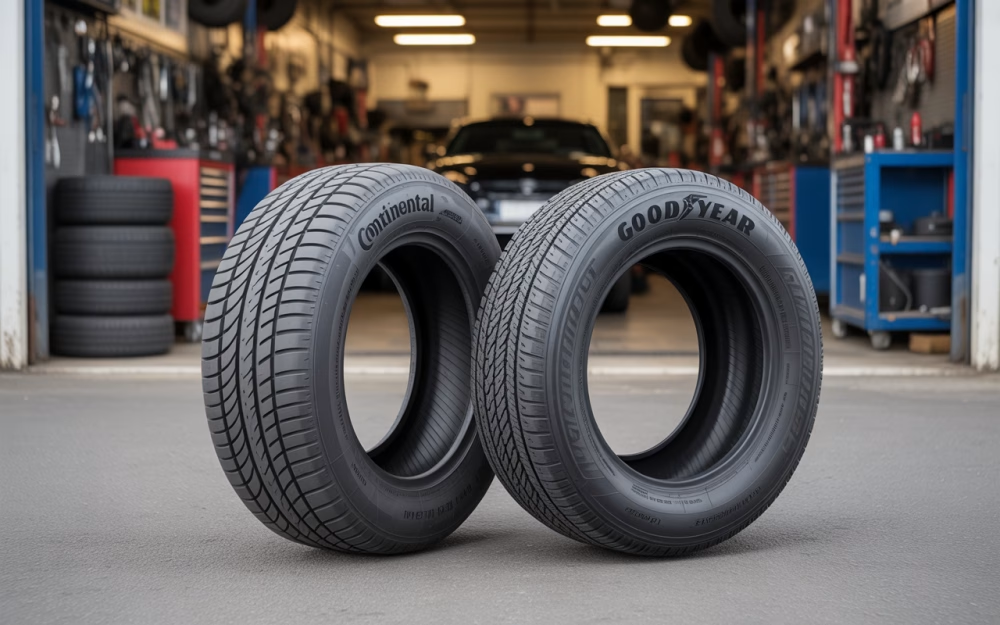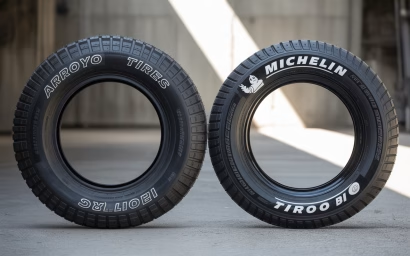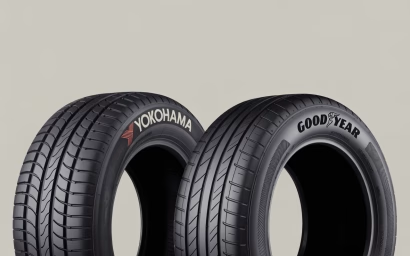Continental AG and The Goodyear Tire & Rubber Company are two of the world’s leading tire manufacturers, each with a rich history and a strong global presence. These two companies have been at the forefront of tire innovation for decades, constantly pushing the boundaries of performance, safety, and sustainability.
Continental, founded in 1871 in Hanover, Germany, has grown into a multinational automotive supplier with a diverse range of products, including tires, automotive components, and industrial applications. The company’s tire division, Continental Tire, is renowned for its cutting-edge technologies and commitment to quality. Continental offers a comprehensive portfolio of tires for passenger cars, light trucks, SUVs, and commercial vehicles, catering to a wide range of driving conditions and customer needs.
On the other hand, Goodyear, established in 1898 in Akron, Ohio, is an American multinational company that has been at the forefront of tire innovation since its inception. Goodyear is widely recognized for its iconic brand and its contributions to the automotive industry, including the development of the first tubeless tire and the introduction of the iconic Goodyear Blimp. Today, Goodyear is a global leader in the tire industry, offering a diverse range of products for passenger cars, trucks, aircraft, and various other applications.
Both Continental and Goodyear have established themselves as market leaders, with a strong presence in original equipment (OE) fitments and aftermarket sales. They have invested heavily in research and development, constantly pushing the boundaries of tire technology to deliver superior performance, safety, and durability. From high-performance tires for sports cars to all-terrain tires for off-road adventures, these companies offer a wide range of products to cater to the diverse needs of drivers around the world.
Table of Contents
Tire Construction and Materials
Continental and Goodyear are two of the leading tire manufacturers in the world, and their construction methods and material choices play a significant role in the performance and durability of their tires.
Continental tires are known for their advanced construction techniques, which often involve the use of specialized compounds and reinforcement materials. One of the key features of Continental tires is their use of silica-based tread compounds, which provide improved grip and traction on wet surfaces while also enhancing fuel efficiency. Additionally, Continental employs advanced manufacturing processes, such as their “ContiSilent” technology, which reduces tire noise and enhances ride comfort.
Goodyear, on the other hand, has a long history of innovation in tire construction. They were among the first to introduce radial tire technology, which significantly improved handling and fuel efficiency compared to traditional bias-ply tires. Goodyear’s tires often feature their proprietary “TripleTred” technology, which combines three different tread compounds to optimize performance in different driving conditions. They also employ various reinforcement materials, such as Kevlar and aramid fibers, to enhance the strength and durability of their tires.
Both companies use a variety of advanced materials in their tire construction, including high-strength steel belts, polyester or nylon carcass plies, and specialized rubber compounds tailored for specific performance characteristics. The choice of materials and their arrangement within the tire’s structure can impact factors such as treadwear, grip, rolling resistance, and overall durability.
While the specific construction methods and materials may vary between Continental and Goodyear, both companies strive to strike a balance between performance, safety, and longevity in their tire designs. Ultimately, the choice between the two brands may come down to personal preferences, driving conditions, and the specific requirements of the vehicle.
Performance Comparison
When it comes to performance, both Continental and Goodyear offer a wide range of tire models designed for different driving conditions and vehicle types. However, there are some notable differences in how their tires perform in various scenarios.
In dry conditions, Continental tires are often praised for their responsive handling and precise steering feel. Their advanced tread patterns and compound formulations provide excellent grip and cornering stability, making them a popular choice among driving enthusiasts and sports car owners.
On the other hand, Goodyear tires tend to excel in wet weather performance. Their advanced tread designs and specialized rubber compounds help channel water away from the contact patch, ensuring reliable traction and shorter braking distances on slippery surfaces.
When it comes to winter driving and snow performance, both brands offer dedicated winter tire models. However, Continental’s winter tires are widely regarded for their exceptional grip and traction on icy and snow-covered roads, thanks to their advanced siping patterns and specialized rubber compounds designed for low temperatures.
For off-road and all-terrain applications, Goodyear has a strong reputation for producing durable and capable tires. Their rugged tread designs and reinforced sidewalls provide excellent traction and puncture resistance, making them a popular choice among truck and SUV owners who frequently venture off the beaten path.
In terms of noise levels, Continental tires are generally known for their quieter and more comfortable ride, thanks to their advanced noise-canceling technologies and tread patterns designed to minimize road noise.
Both brands offer high-performance tires for sports cars and performance vehicles, with each delivering impressive handling characteristics and responsiveness. However, Continental’s ultra-high-performance tires are often praised for their exceptional grip and cornering abilities, while Goodyear’s performance tires are known for their balanced blend of handling, traction, and durability.
Ultimately, the choice between Continental and Goodyear tires will depend on your specific driving needs, vehicle type, and personal preferences. Both brands offer a wide range of high-quality tires designed to excel in different conditions and driving scenarios.
Treadwear and Longevity
When it comes to treadwear and longevity, both Continental and Goodyear tires offer impressive performance, but with some notable differences. Continental tires are known for their exceptional treadwear ratings, which often outperform their competitors. This is due to the advanced compound formulations and tread designs employed by Continental, which are engineered to maximize tread life without compromising grip and handling.
Goodyear, on the other hand, has a long-standing reputation for producing durable tires that can withstand the rigors of long-distance driving and harsh conditions. While their treadwear ratings may not always match those of Continental, Goodyear tires are renowned for their ability to maintain consistent performance over an extended period, thanks to their robust construction and high-quality materials.
Factors such as driving habits, road conditions, and proper maintenance play a crucial role in determining the longevity of tires from both brands. Continental’s tires tend to excel in moderate driving conditions, where their advanced tread designs can maximize treadwear. Goodyear’s tires, however, often shine in more demanding environments, such as off-road or heavy-duty applications, where their rugged construction and reinforced sidewalls provide superior durability.
It’s important to note that treadwear ratings are not the sole determinant of a tire’s lifespan. Factors such as proper inflation, regular rotation, and alignment can significantly impact the longevity of both Continental and Goodyear tires. Additionally, driving habits like aggressive acceleration, hard braking, and excessive cornering can accelerate tread wear, regardless of the brand.
Overall, both Continental and Goodyear offer excellent options when it comes to treadwear and longevity, catering to different driving needs and preferences. Careful consideration of your specific driving conditions and requirements can help you choose the brand that best suits your needs, ensuring optimal performance and value for your investment.
Safety and Reliability
Continental and Goodyear are two of the most trusted names in the tire industry, known for their commitment to safety and reliability. Both manufacturers invest heavily in research and development to create tires that can perform under the most demanding conditions.
When it comes to safety features, Continental tires are renowned for their advanced tread designs and specialized compounds that enhance grip and traction on wet and slippery surfaces. Their tires often feature innovative technologies like reinforced shoulder blocks and optimized sipe patterns, which improve handling and stability, even in extreme weather conditions.
Goodyear, on the other hand, has pioneered several safety innovations over the years, including their patented RunOnFlat technology. This feature allows drivers to continue driving for a limited distance even after a complete loss of air pressure, providing added peace of mind in the event of a puncture or blowout.
In terms of braking performance, both Continental and Goodyear tires consistently rank among the best in independent tests. Continental’s tires are known for their exceptional wet braking capabilities, thanks to their advanced siping patterns and specialized rubber compounds. Goodyear’s tires, meanwhile, often excel in dry braking tests, offering shorter stopping distances on dry pavement.
Reliability is another area where both brands excel. Continental and Goodyear tires are designed and manufactured to stringent quality standards, ensuring consistent performance and durability over their intended service life. Both companies offer extensive warranties and roadside assistance programs, providing added confidence and protection for their customers.
Ultimately, the choice between Continental and Goodyear tires may come down to individual driving needs and preferences. However, both brands have proven track records in delivering safe, reliable, and high-performance tires for a wide range of vehicles and driving conditions.
Fuel Efficiency and Environmental Impact
Tire rolling resistance plays a crucial role in a vehicle’s fuel efficiency and environmental impact. Both Continental and Goodyear have made significant strides in developing low rolling resistance tires that can help reduce fuel consumption and greenhouse gas emissions.
Continental’s EcoPlus technology utilizes advanced compound formulations and tread designs to minimize rolling resistance. Their EcoContact line of tires is specifically engineered to deliver exceptional fuel efficiency without compromising grip or treadwear. These tires can contribute to a reduction in fuel consumption, translating to lower emissions and a smaller carbon footprint.
Goodyear’s FuelMax technology also focuses on optimizing rolling resistance while maintaining performance characteristics. Their Assurance FuelMax and EfficientGrip Performance tires are designed to provide enhanced fuel efficiency, particularly in highway driving conditions. By reducing the energy required to roll the tires, these products can help drivers save on fuel costs and reduce their environmental impact.
Both companies have invested heavily in research and development to create eco-friendly tire compounds that minimize the use of harmful chemicals and promote sustainable manufacturing practices. Continental’s GreenConceptTire and Goodyear’s TripleChip technology are examples of their efforts to produce tires with a lower environmental impact throughout their lifecycle.
While fuel efficiency and environmental considerations are important factors, it’s worth noting that the actual impact on fuel consumption and emissions can vary depending on driving conditions, vehicle type, and other factors. Nonetheless, both Continental and Goodyear are actively working to provide eco-friendly tire options that strike a balance between performance, safety, and environmental responsibility.
Price and Value Comparison
When it comes to pricing, both Continental and Goodyear offer a wide range of tire models to cater to different budgets and vehicle types. Generally, Continental tires tend to be more expensive than their Goodyear counterparts, reflecting their positioning as a premium brand. However, the price difference can vary significantly depending on the specific tire model and size.
Continental’s pricing strategy focuses on delivering high-performance tires with advanced technologies and premium materials. Their tires often incorporate features like specialized tread compounds, reinforced sidewalls, and optimized tread patterns for enhanced grip, handling, and durability. This attention to detail and engineering excellence comes at a higher cost, but many consumers are willing to pay a premium for the superior performance and safety offered by Continental tires.
Goodyear, on the other hand, aims to provide a balance between performance and affordability. While their top-tier models may compete with Continental’s offerings in terms of technology and capabilities, Goodyear also offers a broader range of mid-range and budget-friendly tire options. This diversity in their product lineup allows consumers to choose tires that fit their specific needs and budget constraints.
Both manufacturers offer warranties on their tires, although the coverage and terms can differ. Continental typically provides longer treadwear warranties, reflecting their confidence in the longevity of their tires. Goodyear’s warranties may not be as extensive but are still competitive within their respective product categories.
When considering the overall value proposition, Continental tires often appeal to driving enthusiasts, luxury vehicle owners, and those prioritizing performance and safety over upfront costs. Their tires are designed to deliver a superior driving experience, enhanced handling, and improved vehicle control, justifying the higher price tag for many consumers.
Goodyear, on the other hand, caters to a broader audience seeking a balance between performance, affordability, and value. Their tires offer reliable performance and decent longevity at a more accessible price point, making them a popular choice for budget-conscious consumers or those with more moderate driving needs.
Ultimately, the choice between Continental and Goodyear tires will depend on individual priorities, driving habits, and budget considerations. While Continental offers a premium experience with cutting-edge technologies, Goodyear provides a compelling value proposition with a diverse range of options to suit various needs and budgets.
OEM Partnerships and Fitments
Both Continental and Goodyear have established long-standing partnerships with various vehicle manufacturers, supplying original equipment (OE) tires for a wide range of passenger cars, SUVs, and light trucks. These partnerships are crucial for tire manufacturers as they provide a steady stream of business and exposure to consumers.
Continental has secured OEM fitments with several major automakers, including Volkswagen, Ford, General Motors, and BMW. The company’s tires are often specified as original equipment on many popular models from these brands, such as the Volkswagen Jetta, Ford Mustang, Chevrolet Camaro, and BMW 3 Series.
On the other hand, Goodyear has an extensive portfolio of OEM partnerships, including collaborations with Toyota, Honda, Nissan, and Fiat Chrysler Automobiles. Goodyear’s tires are frequently found on vehicles like the Toyota Camry, Honda Accord, Nissan Altima, and Jeep Wrangler, among others.
Both companies invest heavily in research and development to create tires tailored to the specific requirements of each vehicle manufacturer. This includes optimizing tire compounds, tread patterns, and construction methods to ensure optimal performance, handling, and ride quality for the intended application.
Furthermore, Continental and Goodyear work closely with automakers during the vehicle development process, ensuring their tires are thoroughly tested and validated to meet the manufacturer’s stringent standards. This collaborative approach helps ensure a seamless integration between the tires and the vehicle’s suspension, steering, and braking systems, resulting in a cohesive driving experience for consumers.
Customer Reviews and Satisfaction
Both Continental and Goodyear tires receive generally positive customer reviews, with each brand having its strengths and weaknesses. Continental tires are often praised for their excellent handling, responsiveness, and high-performance capabilities, particularly in dry and wet conditions. Customers appreciate the tires’ ability to provide a smooth and comfortable ride while maintaining a firm grip on the road. However, some customers have reported shorter-than-expected treadwear and higher noise levels compared to other premium tire brands.
Goodyear tires, on the other hand, are commended for their durability, treadwear, and overall value for money. Many customers have reported getting impressive mileage out of their Goodyear tires before needing to replace them. The brand’s all-season and winter tires are particularly well-regarded for their reliable traction and performance in various weather conditions. However, some customers have noted that Goodyear tires may not offer the same level of responsiveness and handling precision as some of their competitors, especially in high-performance applications.
In terms of customer satisfaction ratings, both Continental and Goodyear rank highly among major tire manufacturers. Continental consistently receives high scores for overall quality, performance, and customer satisfaction, often placing near the top of industry rankings. Goodyear, while not always at the very top, also maintains strong satisfaction ratings, particularly for its value proposition and treadwear warranties.
It’s worth noting that customer reviews and satisfaction can vary depending on the specific tire model, driving conditions, and individual preferences. Some customers may prioritize performance over longevity, while others may value the opposite. Additionally, proper tire maintenance and rotation can significantly impact a tire’s lifespan and overall performance.
Choosing the Right Tires for Your Needs
When it comes to selecting between Continental and Goodyear tires, there are several factors to consider based on your driving conditions, vehicle type, and personal preferences.
Driving Conditions
- If you frequently drive in wet or snowy conditions, look for tires with excellent traction and hydroplaning resistance. Both Continental and Goodyear offer specialized tires for these conditions.
- For dry, hot climates, prioritize tires with good heat resistance and long treadwear.
- If you live in an area with rough roads or frequent off-road driving, consider tires with reinforced sidewalls and robust construction.
Vehicle Type
- For passenger cars and sedans, both brands offer a wide range of touring and performance tires suitable for various driving styles.
- For SUVs and light trucks, look for tires designed for the added weight and higher center of gravity, such as Continental’s CrossContact or Goodyear’s Wrangler series.
- For sports cars and high-performance vehicles, consider Continental’s ExtremeContact or Goodyear’s Eagle series for enhanced grip and handling.
Personal Preferences
- If you prioritize a smooth, comfortable ride, look for tires with higher sidewall heights and softer compounds.
- For those seeking maximum treadwear and value, consider tires with longer treadwear warranties from either brand.
- If you value a quieter ride, look for tires with noise-reducing technologies like Continental’s ContiSilent or Goodyear’s SoundComfort.
Ultimately, the right tire choice depends on your specific needs and driving habits. Consult with tire professionals, read reviews, and consider your budget to make an informed decision between Continental and Goodyear tires.
Future Trends and Innovations
Both Continental and Goodyear are actively investing in research and development to drive innovation in the tire industry. As concerns over environmental sustainability and the need for enhanced performance continue to grow, these companies are exploring new technologies and materials to stay ahead of the curve.
One area of focus is the development of tires with improved rolling resistance, which can significantly reduce fuel consumption and carbon emissions. Continental is working on advanced silica compounds and optimized tread designs to minimize energy losses, while Goodyear is exploring the use of soybean-based materials and innovative tread patterns for better fuel efficiency.
Another trend is the integration of smart technologies into tires. Continental’s ContiSense concept features embedded sensors that can monitor tire pressure, temperature, and other parameters in real-time, enabling predictive maintenance and optimized performance. Goodyear’s intelligent tire prototype, equipped with sensors and cloud-based monitoring, aims to enhance safety and provide valuable data for fleet management.
Sustainability is a key focus for both companies. Continental is investing in eco-friendly production processes and exploring the use of recycled and renewable materials in tire manufacturing. Goodyear’s efforts include the development of tires made from sustainable soybean oil and silica derived from rice husk ash, reducing the reliance on petroleum-based materials.
Looking ahead, Continental and Goodyear are also exploring the potential of airless tire concepts, which could revolutionize the industry by eliminating the need for air pressure and reducing the risk of punctures. These tires are designed with a unique structure that supports the vehicle’s weight without the need for inflation, offering improved safety and reduced maintenance requirements.
As the automotive industry continues to evolve with the rise of electric vehicles and autonomous driving technologies, tire manufacturers are adapting their products to meet the unique demands of these new platforms. Continental and Goodyear are collaborating with automakers to develop specialized tires optimized for electric vehicles’ instant torque and weight distribution, as well as tires designed for the specific requirements of self-driving cars.
Overall, the future of the tire industry promises exciting advancements in performance, sustainability, and safety, driven by the innovative efforts of leading manufacturers like Continental and Goodyear.
Conclusion
When it comes to choosing between Continental and Goodyear tires, there is no clear-cut winner as both brands offer high-quality products with their own strengths and weaknesses. However, based on the performance comparisons, customer reviews, and value assessments, some key points can be highlighted to help guide your decision.
Continental tires generally excel in areas such as handling, responsiveness, and dry grip, making them a popular choice for drivers who prioritize performance and driving dynamics. Their advanced technologies, like the proprietary compound formulations and tread designs, contribute to their overall prowess on the road. However, Continental tires can be more expensive than their Goodyear counterparts, which may be a consideration for budget-conscious consumers.
On the other hand, Goodyear tires are renowned for their durability, treadwear longevity, and overall value proposition. They offer a wide range of options suitable for various driving conditions and vehicle types, from passenger cars to SUVs and light trucks. While they may not match the outright performance of some Continental models, Goodyear tires strike a balance between capability, comfort, and affordability, making them a practical choice for many drivers.
Ultimately, the decision between Continental and Goodyear tires should be based on your specific driving needs, vehicle requirements, and budget considerations. If you prioritize handling precision, responsive steering, and a sporty driving experience, Continental tires may be the better option. However, if you value long-lasting tread life, consistent all-season performance, and cost-effectiveness, Goodyear tires could be the more suitable choice.
It’s also worth considering the intended use of your vehicle, as well as the driving conditions you typically encounter. For example, if you live in an area with severe winter weather, both brands offer specialized winter tire lines that can provide enhanced traction and safety on snow and ice.
Regardless of your choice, it’s essential to follow the recommended tire maintenance practices, such as regular rotations, proper inflation, and timely replacements, to ensure optimal performance and safety throughout the tires’ lifespan.



